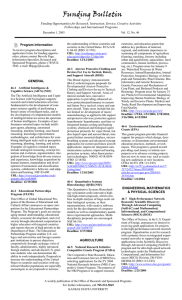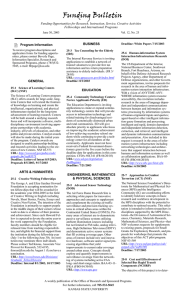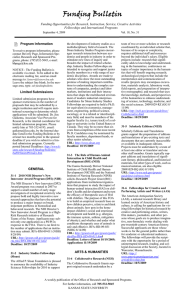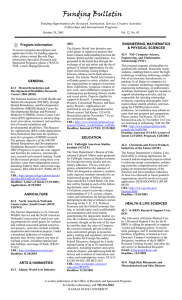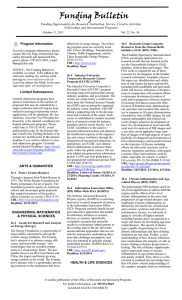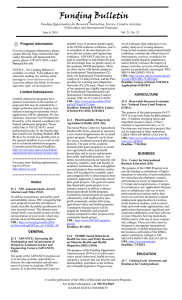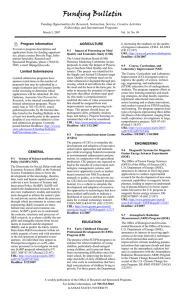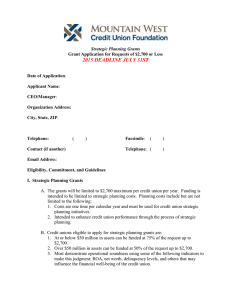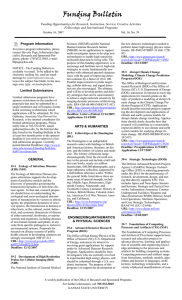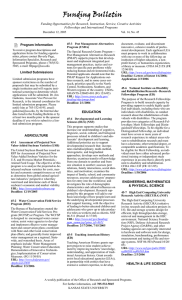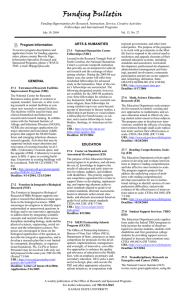Funding Opportunities for Research, Instruction, Service, Creative Activities
advertisement
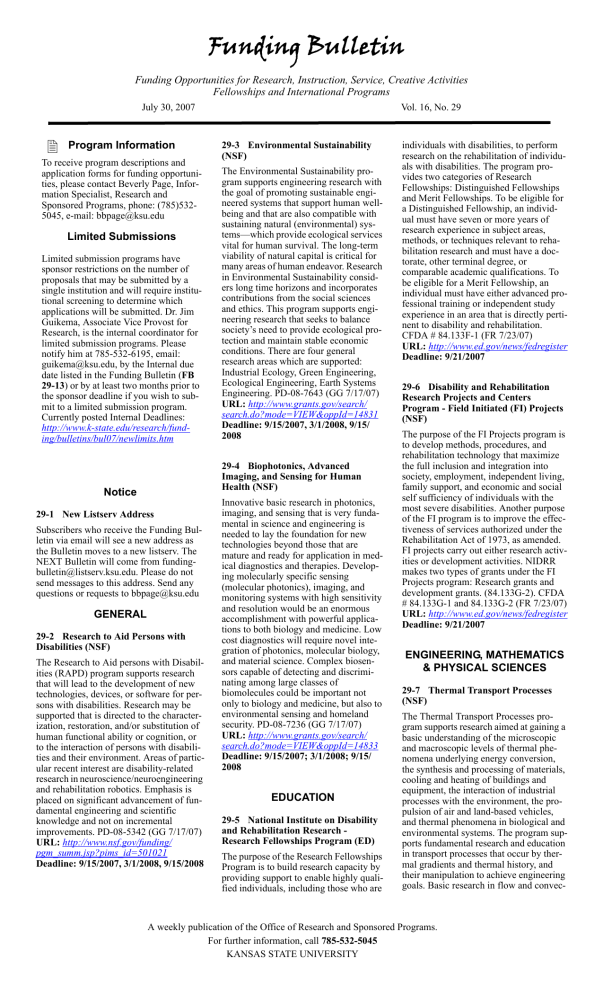
Funding Bulletin Funding Opportunities for Research, Instruction, Service, Creative Activities Fellowships and International Programs July 30, 2007 Program Information To receive program descriptions and application forms for funding opportunities, please contact Beverly Page, Information Specialist, Research and Sponsored Programs, phone: (785)5325045, e-mail: bbpage@ksu.edu Limited Submissions Limited submission programs have sponsor restrictions on the number of proposals that may be submitted by a single institution and will require institutional screening to determine which applications will be submitted. Dr. Jim Guikema, Associate Vice Provost for Research, is the internal coordinator for limited submission programs. Please notify him at 785-532-6195, email: guikema@ksu.edu, by the Internal due date listed in the Funding Bulletin (FB 29-13) or by at least two months prior to the sponsor deadline if you wish to submit to a limited submission program. Currently posted Internal Deadlines: http://www.k-state.edu/research/funding/bulletins/bul07/newlimits.htm Vol. 16, No. 29 29-3 Environmental Sustainability (NSF) The Environmental Sustainability program supports engineering research with the goal of promoting sustainable engineered systems that support human wellbeing and that are also compatible with sustaining natural (environmental) systems—which provide ecological services vital for human survival. The long-term viability of natural capital is critical for many areas of human endeavor. Research in Environmental Sustainability considers long time horizons and incorporates contributions from the social sciences and ethics. This program supports engineering research that seeks to balance society’s need to provide ecological protection and maintain stable economic conditions. There are four general research areas which are supported: Industrial Ecology, Green Engineering, Ecological Engineering, Earth Systems Engineering. PD-08-7643 (GG 7/17/07) URL: http://www.grants.gov/search/ search.do?mode=VIEW&oppId=14831 Deadline: 9/15/2007, 3/1/2008, 9/15/ 2008 29-4 Biophotonics, Advanced Imaging, and Sensing for Human Health (NSF) Notice 29-1 New Listserv Address Subscribers who receive the Funding Bulletin via email will see a new address as the Bulletin moves to a new listserv. The NEXT Bulletin will come from fundingbulletin@listserv.ksu.edu. Please do not send messages to this address. Send any questions or requests to bbpage@ksu.edu GENERAL 29-2 Research to Aid Persons with Disabilities (NSF) The Research to Aid persons with Disabilities (RAPD) program supports research that will lead to the development of new technologies, devices, or software for persons with disabilities. Research may be supported that is directed to the characterization, restoration, and/or substitution of human functional ability or cognition, or to the interaction of persons with disabilities and their environment. Areas of particular recent interest are disability-related research in neuroscience/neuroengineering and rehabilitation robotics. Emphasis is placed on significant advancement of fundamental engineering and scientific knowledge and not on incremental improvements. PD-08-5342 (GG 7/17/07) URL: http://www.nsf.gov/funding/ pgm_summ.jsp?pims_id=501021 Deadline: 9/15/2007, 3/1/2008, 9/15/2008 Innovative basic research in photonics, imaging, and sensing that is very fundamental in science and engineering is needed to lay the foundation for new technologies beyond those that are mature and ready for application in medical diagnostics and therapies. Developing molecularly specific sensing (molecular photonics), imaging, and monitoring systems with high sensitivity and resolution would be an enormous accomplishment with powerful applications to both biology and medicine. Low cost diagnostics will require novel integration of photonics, molecular biology, and material science. Complex biosensors capable of detecting and discriminating among large classes of biomolecules could be important not only to biology and medicine, but also to environmental sensing and homeland security. PD-08-7236 (GG 7/17/07) URL: http://www.grants.gov/search/ search.do?mode=VIEW&oppId=14833 Deadline: 9/15/2007; 3/1/2008; 9/15/ 2008 EDUCATION 29-5 National Institute on Disability and Rehabilitation Research Research Fellowships Program (ED) The purpose of the Research Fellowships Program is to build research capacity by providing support to enable highly qualified individuals, including those who are individuals with disabilities, to perform research on the rehabilitation of individuals with disabilities. The program provides two categories of Research Fellowships: Distinguished Fellowships and Merit Fellowships. To be eligible for a Distinguished Fellowship, an individual must have seven or more years of research experience in subject areas, methods, or techniques relevant to rehabilitation research and must have a doctorate, other terminal degree, or comparable academic qualifications. To be eligible for a Merit Fellowship, an individual must have either advanced professional training or independent study experience in an area that is directly pertinent to disability and rehabilitation. CFDA # 84.133F-1 (FR 7/23/07) URL: http://www.ed.gov/news/fedregister Deadline: 9/21/2007 29-6 Disability and Rehabilitation Research Projects and Centers Program - Field Initiated (FI) Projects (NSF) The purpose of the FI Projects program is to develop methods, procedures, and rehabilitation technology that maximize the full inclusion and integration into society, employment, independent living, family support, and economic and social self sufficiency of individuals with the most severe disabilities. Another purpose of the FI program is to improve the effectiveness of services authorized under the Rehabilitation Act of 1973, as amended. FI projects carry out either research activities or development activities. NIDRR makes two types of grants under the FI Projects program: Research grants and development grants. (84.133G-2). CFDA # 84.133G-1 and 84.133G-2 (FR 7/23/07) URL: http://www.ed.gov/news/fedregister Deadline: 9/21/2007 ENGINEERING, MATHEMATICS & PHYSICAL SCIENCES 29-7 Thermal Transport Processes (NSF) The Thermal Transport Processes program supports research aimed at gaining a basic understanding of the microscopic and macroscopic levels of thermal phenomena underlying energy conversion, the synthesis and processing of materials, cooling and heating of buildings and equipment, the interaction of industrial processes with the environment, the propulsion of air and land-based vehicles, and thermal phenomena in biological and environmental systems. The program supports fundamental research and education in transport processes that occur by thermal gradients and thermal history, and their manipulation to achieve engineering goals. Basic research in flow and convec- A weekly publication of the Office of Research and Sponsored Programs. For further information, call 785-532-5045 KANSAS STATE UNIVERSITY tive processes with and without phase change, heat and mass transfer at nanoand molecular scales, radiative transport, and the fundamental characterization of material properties important to these processes are especially relevant to this program. PD-08-1406 (GG 7/17/07) URL: http://www.grants.gov/search/ search.do?mode=VIEW&oppId=14836 Deadline: 9/15/2007, 3/1/2008 29-8 Market-Based Approaches to Reducing Greenhouse Gas Emissions Through Energy Efficiency in Homes and Buildings (EPA) The Climate Protection Partnerships Division seeks proposals from eligible entities that will advance national, regional, and local energy efficiency programming by utilizing market-based approaches to program design and delivery and by fostering information exchange on policies that are supportive of these approaches. CPPD seeks proposals that demonstrate potential to create lasting change in the market for energy efficient products, services, and best practices. Proposals submitted for consideration should: 1) identify unique constituencies and approaches or channels for working with stakeholders; 2) demonstrate an understanding of the technologies and market structure for delivery of the technologies, or best practices, to end users; 3) identify market barriers to greater adoption of energy efficient technologies, or best practices, 4) delineate strategies for overcoming barriers identified. EPA-OAR-CPPD-07-08 (GG 7/17/ 07) URL: http://www.grants.gov/search/ search.do?mode=VIEW&oppId=14845 Deadline: 8/30/2007 29-9 Particulate and Multiphase Processes (NSF) The Particulate and Multiphase Processes program supports fundamental and applied research on mechanisms and phenomena governing particulate and multiphase processes, including granular and granular-fluid flows, particle/bubble/ droplet interactions, aerosol science and technology, suspensions, micro- and nano-structured fluids, self- and directedassembly of nanostructures, and related instrumentation and diagnostics. Innovative research is sought that contributes to improving that basic understanding, design, predictability, efficiency, and control of particulate and multiphase processed with particular emphasis on: new frontiers in nanotechnology, novel manufacturing techniques, nano-metrology, multiphase transport in biological systems, and complex engineering systems. PD-08-1415 (GG 7/17/07) URL: http://www.grants.gov/search/ search.do?mode=VIEW&oppId=14839 Deadline: 9/15/2007, 3/1/2008 29-10 Chemical and Biological Separations (NSF) The Chemical and Biological Separations (CBS) program supports fundamental research on novel methods and materials for separation processes. These processes are central to the chemical, biochemical, materials, energy and pharmaceutical industries. A fundamental understanding of the interfacial, transport, and thermodynamic behavior of multiphase chemical systems as well as quantitative descriptions of processing characteristics in the process-oriented industries is critical for efficient resource management and effective environmental protection. The program encourages proposals that address emerging research areas and technologies, have a high degree of interdisciplinary thought coupled with knowledge creation, and integrate education and research. Areas of emphasis include separation of biological molecules and separations that lead to environmentally benign processing. PD-08-1417 (GG 7/17/07) URL: http://www.grants.gov/search/ search.do?mode=VIEW&oppId=14835 Deadline: 9/15/2007, 3/1/2008 HEALTH & LIFE SCIENCES 29-11 Mechanisms of Immune Modulation (R01) (NIH) This Funding Opportunity Announcement (FOA) encourages mechanistic studies of complementary and alternative medicine (CAM) modalities believed to modulate immune function. It is not intended to support efficacy studies. This FOA will utilize the NIH Research Project Grant (R01) award mechanism and runs in parallel with an FOA of identical scientific scope, RFA-AT-07-005, that solicits applications under the R21 mechanism. RFA-AT-07-005 (NIHG 7/20/07)) URL: http://grants.nih.gov/grants/guide/ rfa-files/RFA-AT-07-004.html Deadline: 11/14/2007 of Infectious Disease (BWF) The Burroughs Wellcome Fund’s (BWF’s) The Investigators in the Pathogenesis of Infectious Disease program provides opportunities for assistant professors to bring multidisciplinary approaches to the study of human infectious diseases. The goal of the program is to provide opportunities for accomplished investigators still early in their careers to study the pathogenesis of infectious disease at its most fundamental level—the points where human and microbial systems connect. The program supports research that sheds light on the fundamentals that affect the outcomes of this encounter: how colonization, infection, commensalism, and other relationships play out at levels ranging from molecular interactions to systemic ones. BWF is particularly interested in work focused on the host, as well as host-pathogen studies originating in viral, bacterial, fungal, or parasite systems. An institution—including its medical school, graduate schools, and all affiliated hospitals and research institutes—may nominate up to two candidates. Institutions that nominate a researcher who holds the D.V.M. will be allowed three nominations. URL: http://www.bwfund.org/programs/ infectious_disease/ pathogenesis_main.html Deadline: Internal 9/1/2007, 11/1/2007 29-12 Tools and Techniques for Elucidating and Manipulating Neural Circuit Development (R21) (NIH) The NIH Blueprint for Neuroscience Research is a framework to enhance cooperative activities among the NIH Office of the Director and 15 NIH Institutes and Centers that support research on the central and peripheral nervous systems. In fiscal year 2008, the Blueprint is emphasizing neural development. This Funding Opportunity Announcement solicits applications directed toward the discovery of novel and/or improved means for precise spatiotemporal analysis or manipulation of circuit assembly in the developing central and peripheral nervous systems. Tools and technologies for the study of invertebrates, vertebrates and/or humans are acceptable if the resulting resources will accelerate research in the area of neural circuit development. RFAMH-08-060 (NIHG 7/20/07) URL: http://grants.nih.gov/grants/guide/ rfa-files/RFA-MH-08-060.html Deadline: Letters of Intent 8/17/2007; Applications 9/17/2007 29-13 Investigators in the Pathogenesis R.W. Trewyn, Vice Provost for Research & Dean of the Graduate School Jim Guikema, Associate Vice Provost, Graduate Research Caron Boyce, Administrative Specialist Preaward Section Paul Lowe, Director Anita Fahrny, Assistant Director Kathy Tilley, Rich Doan, Carmen Garcia, Candice Foster, Danielle Brunner, Rex Goff, Dawn Caldwell, Sharon Zoeller Information Specialist & Editor Beverly Page Human Subjects, Animal Care & Use, and Biosafety Gerald P. Jaax, Research Compliance Officer Ashley Rhodes, Compliance Liaison Adassa Roe, Administrative Specialist Congressional Relations Sue Peterson, R.W. Trewyn A weekly publication of the Office of Research and Sponsored Programs. For further information, call 785-532-5045 KANSAS STATE UNIVERSITY
